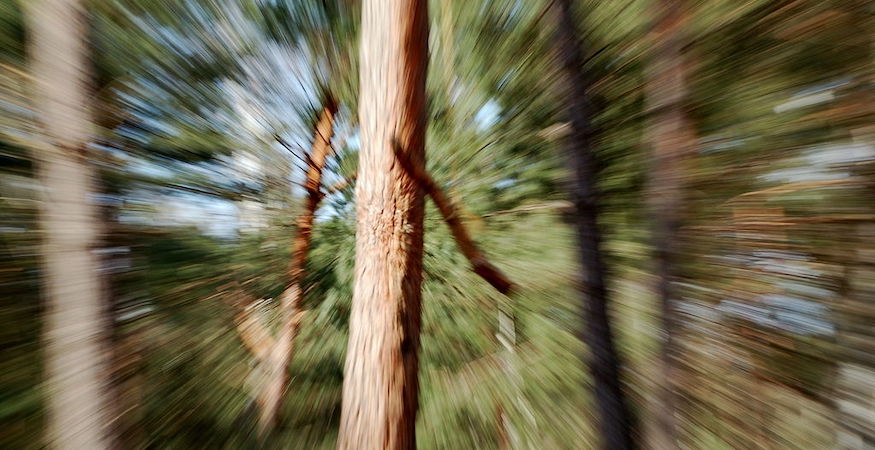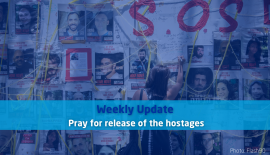Shifting Perspectives in Times of War
You don’t have to be a professional photographer to know that the closer you get to an object with your camera, (optical or physically) the less background will appear in the final photo, and the further you step away from the object you want to take a photo of, more things will appear in the surroundings. This zooming in and zooming out is a little bit like war.
When Israel was attacked on a day which will forever be inscribed in history, Israelis and people world over, zoomed in to our little state. There could have been a plague decimating half of the world, but that wouldn’t have mattered. Nothing else mattered except the fact that Israel’s borders had been violated and the Jewish people had sustained the worst atrocities since the Holocaust. Depending who they were, there was shock or glee.
“Ever since the ground invasion began, the Israeli collective heart sinks when another soldier falls”
For Israelis, there was, and still is, something so unbelievable about the footage of our women in blood-stained paints, and Grandmother’s displayed on Israeli golf carts dragged off to Gaza, that no matter how many times we watch it, it still doesn’t sink in. Posters of the kidnapped are plastered on road junctions, walls, fences, public buildings and schools. Right at the beginning of the war, local municipalities enlisted thousands of residents for first-responder training. WhatsApp groups all over the country were formed and people checked in hourly as the news got worse and worse. National enlistment and volunteering were at fever pitch. The likes of those who only a day before had locked up their hi-tech office for the weekend, now travelled miles either to serve in the military or get their hands dirty by helping the local farmers. Radios blasted on public transport where passengers sat in an unfamiliar silence, waiting for news of who else has died. Ever since the ground invasion began, the Israeli collective heart sinks when another soldier falls. The tension is unbearable as people wait for the names to be announced. Will it be their own son or daughter, father or husband who never again shall return?
“Will it be their own son or daughter, father or husband who never again shall return?”
This has been the state of being for a staggering five months, yet with that, in the last week of February, there was one day where the only item on our screens was the excitement of the local municipal elections. More hours were devoted to covering that frankly boring event, than a terror attack in which 2 people were murdered that day in cold blood. Talking of terror attacks, they too have become so frequent, that what used to be days of coverage prior to October 7th, now barely makes the evening news.
Back to the local elections, of which there was more to the reports of this tedious event than meets the eye. Bearing in mind that we still have babies held hostage in Gaza, and tens of rockets fell on the Golan from what seemed to be a precursor for a bigger war, this disproportionate coverage was, in effect, our national camera zooming out.
It wasn’t just a reminder that somehow even in war, life must go on, or just as necessity to lift the public moral. It was something far deeper. Those peripheral things we complained about before the war, were wiped off the map on October 7th. And it is these very same peripheral things that we now so sorely miss.
The Greek historian Herodotus famously said “No water flows in the same river twice.” It is human nature to pine for how things were. But Herodotus was right. We can’t go back. Ever.
“Adjusting to death for the sake of survival means postponing personal and national long-term grief until the war is over”
For an individual or a nation to physically, nationally and mentally survive a war, it is necessary to adjust and accustom ourselves to death. Adjusting to death for the sake of survival means postponing personal and national long-term grief until the war is over. As King Solomon, the author of Ecclesiastes, so succinctly said, “There is a time for everything.”
Yet accustoming ourselves to death is a delicate psychological predicament. If we don’t, we stand to become overwhelmed and unable to function, but if we do make ourselves “get used to it” we are in danger of becoming so hard-hearted we are unable to ever love or care again. Accustoming ourselves is like the zoom on a camera. We need to know how and when to zoom in and out, what to focus on and why. Objectives and emotions must be kept sharp. The big and small picture are both essential and focusing on the right object – at the right time – is critical.
“The Torah (Deuteronomy 21:22-23) commands the children of Israel to take down before sunset the body of an executed person hanged from a tree”
There is a passage in the Torah (Deuteronomy 21:22-23) in which the children of Israel are commanded to take down before sunset the body of an executed person hanged from a tree. God knew his handiwork. He knew that if we looked at death for too long it would have a price. That price was explained by the medieval Jewish commentator Rashi. For a body to be left visible too long was akin to degrading our Creator. To look too long at a corpse was also a violation of those made in the Creator’s image. Death was something that mere human beings could never really understand, except the fact that Death was sacred.
“Death has been forced upon Israel again when the war broke out five months ago”
Back to contemporary times, Death has been forced upon Israel again when the war broke out five months ago. War is real, grief is real, the bitterness is real. The Jewish people are in a familiar situation in the sense that Death has hounded us for thousands of years all over the world. But in our own Homeland, we find ourselves juggling with Death on such a scale we could barely have imagined.
Ironically, it is this unwelcome visit from Death which is something that those living in peacetime societies invite into their personal space. From comfy living rooms, millions tune in to social media and the entertainment industry to be entertained by the death of another. However far away someone is from carnage, computers and phones see to it that anyone can satiate a macabre yet natural fascination with Death. Murder mysteries, murder documentaries, murder-this, and murder-that.
What was unacceptable on screens just a few years ago, is boring for most today, even the news which often covers slaughter in real-time. What makes a clip more appealing is eavesdropping on the pleas of the dying. Even more binge-worthy is watching those around, desperately trying to help: if they’re not too busy filming with their phones, for making something go viral, is more important than helping someone out. Once this footage does go viral, with deluded spiritual impunity people put up their feet, crack open a beer and watch others die. A heart-felt and appreciated response to someone dying in agony is a red-faced emoji followed by a quick scroll and a click on a little love heart – in response to footage of a hamster eating broccoli.
Death should not serve as entertainment, or be used as a platform for popularity to boost our following and accumulate “likes.” The role of death is not to arouse in us fascination or voyeurism as it comes to claim the lives of others. Ignorant of the fatal blow that watching these things has on us, we become desensitized. So, it is not just the object of our fascination who dies, but we are dying too. We are dying of overexposure to death. Death has a task. Death serves to remind us that life is to be cherished because life is not forever. The role of death is to instil in us appreciation for life, it is to remind us that we have a role, to take on the yoke of responsibility that comes with the business of living.
If the coverage of the Israel local elections has taught Israelis anything, then it is good to zoom out, to remind ourselves that life goes on. But it was temporary. We have had to zoom in again and go back to the war.
Although we may want to go back to who we were before this war, deep down we know there is no going back. It is a matter of keeping firm in our mission to destroy the savage enemy but soft enough in our souls so as not to become accustomed to Death. And for those who are fortunate to live in peace, the obsession with Death as entertainment, will remain repulsive to those of us where Death is part of our landscape.
Thus, even in war, Israel has a commission. I believe we should remind others that it is imperative that every individual whoever they are, use their time for the good of their families, their friends, their communities, and their nation. The certainty of our own death spurs us on to become kinder and better people. Drawing on our ancient sources and the contemporary reality, Israel can remind the world that if, and when, someone has the misfortune – or makes the choice – to watch someone dying, then Death is a sacred event to be handled with care, trepidation and caution so as not to desecrate others or the Divine.





